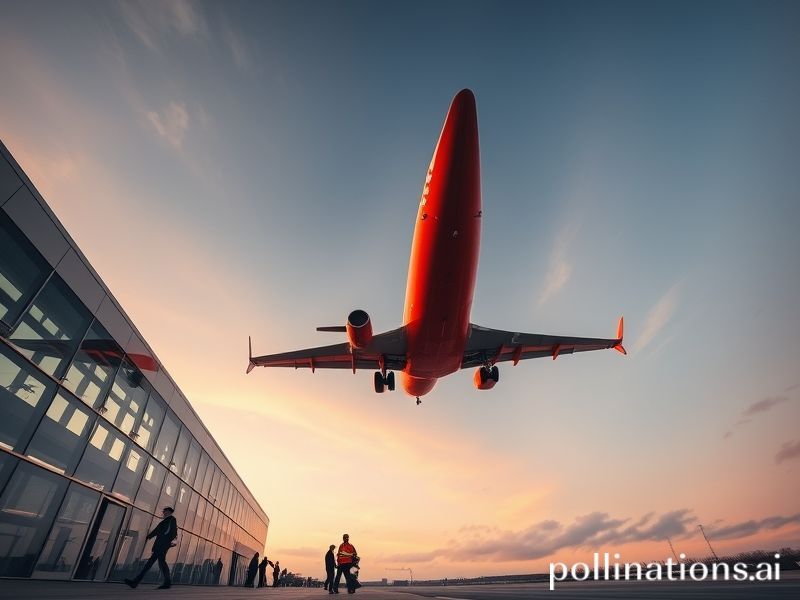EasyJet: The Orange Canary in Globalization’s Coal Mine
EasyJet and the Great Orange Descent: How a Budget Airline Became a Global Mood Ring
By Our Man in the Departure Lounge
It is 06:47 at Gatwick, and the queue for EasyJet flight EZY9001 to Dubrovnik already resembles a UN refugee camp sponsored by Pret A Manger. The passengers—German backpackers, French retirees, a Ghanaian wedding party and one very confused Canadian influencer—are united only by the shared delusion that paying €29.99 for a seat somehow exempts them from the laws of physics, thermodynamics and basic dignity. It is here, between the overpriced water fountain and the gate that will change three times before boarding, that one grasps EasyJet’s true role in the twenty-first-century order: not merely an airline but a flying referendum on the global middle class’s collective tolerance for humiliation.
EasyJet was born in 1995, the same year the World Trade Organization opened for business and a full twelve months before the Spice Girls told us what we really, really wanted. Its original sin—apart from that shade of orange normally reserved for safety vests and Dutch royal funerals—was to democratize European skies the way Napster democratized music: by removing every last shred of romance, legroom and plausible deniability. Suddenly, every call-center temp from Leeds could weekend in Mykonos, climate guilt neatly outsourced to the aviation industry’s bookkeeping department. Three decades on, the carrier’s 300-odd Airbus A320-family jets crisscross a continent whose borders are simultaneously hardening (Brexit, Schengen anxiety, biometric gates) and dissolving (€29 fares, TikTok geotags, bachelor-party vomit).
Globally, EasyJet is a minnow. Its 100-million-odd annual passengers would fit comfortably inside China’s week-long Lunar New Year rail migration, with room left over for several Shanghais. Yet the airline’s operational hiccups are tracked by Bloomberg terminals from São Paulo to Singapore with the morbid fascination usually reserved for emerging-market currency crises. Why? Because EasyJet is the canary in the planetary coal mine of just-in-time logistics. When a single understaffed control tower in Marseille sneezes, stag parties in Prague catch cold, and suddenly Dutch tulip exporters are frantically rerouting perishables through Frankfurt. The butterfly effect now wears an orange lanyard.
The pandemic, of course, was the airline’s near-death experience—an induced coma financed by the UK Treasury and several rounds of “please don’t panic” Zoom calls with bondholders. EasyJet survived, leaner and meaner, only to emerge into a world where passenger rage inflates faster than CPI. Last summer, as temperatures in London hit 40°C and the tarmac at Luton began to resemble a low-budget reenactment of Lawrence of Arabia, the airline cancelled thousands of flights, blaming everything from Ukrainian airspace closures to an IT contractor who allegedly outsourced his own job to a beach bar in Goa. Shareholders tutted; stranded holidaymakers wept into €7.50 meal vouchers; Greta Thunberg posted a single, devastating smiley face.
Now consider the geopolitical layer. EasyJet’s biggest non-UK market is—irony klaxon—Italy, a country whose governments change more frequently than the airline’s snack menu. When Rome slapped a windfall tax on airlines this spring, EasyJet responded with the diplomatic finesse of a stag-party Brit asking where the nearest kebab shop is. Cue retaliatory slot reductions, reciprocal bureaucratic pettiness and a masterclass in how low-cost carriers accidentally become soft-power irritants. Meanwhile, the airline’s flirtation with electric aircraft (a jaunty partnership with Rolls-Royce that sounds like a Marvel spin-off) allows European regulators to pretend that net-zero aviation is just one R&D grant away, rather than a thermodynamic hallucination on par with perpetual motion machines.
And so we return to the departure lounge, where the Dubrovnik flight has now been delayed indefinitely due to “late inbound aircraft,” a phrase that sounds almost philosophical. The Ghanaian bride is teaching the Canadian influencer how to play Ludo on a phone with 3 % battery; a French octogenarian explains, with admirable Gallic shrugging, that at his age any take-off is statistically redundant. Somewhere above the Adriatic, contrails sketch orange promises across a warming sky, and one realizes that EasyJet’s greatest achievement is not cheap travel, but the normalization of permanent precarity—an entire generation conditioned to expect less, pay extra for breathing room and applaud when the plane merely lands.
In the end, the airline is us: loud, impatient, bargain-hunting, climate-anxious and only borderline in control. Buckle up, tray tables up, hope in the upright and locked position.







